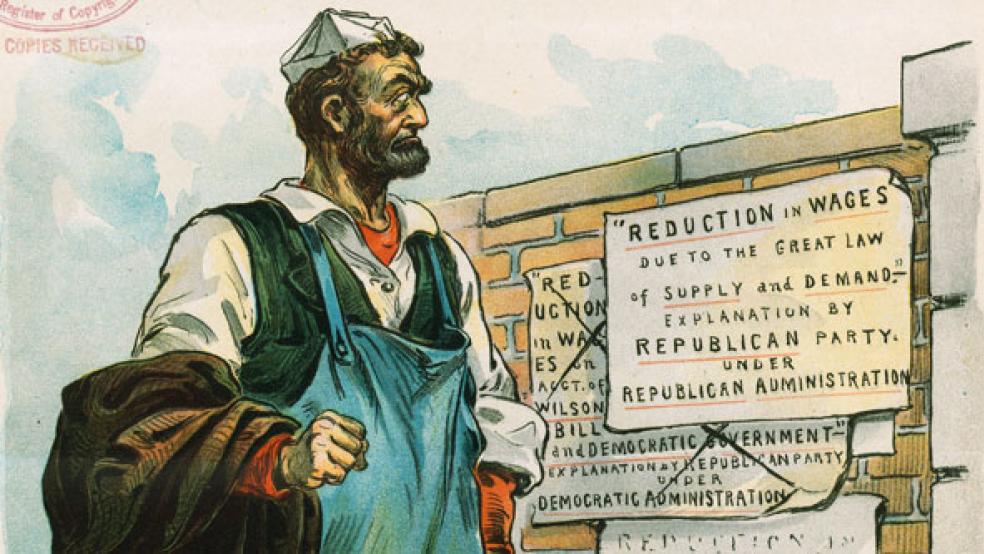President Obama unveiled his latest initiative to enhance economic growth, create quality jobs, and reduce inequality last week, an approach he calls growing from the “middle out.” The basis of this approach is the idea that rising inequality has redirected income from the middle class to the top of the income distribution, and the reduced buying power of the middle class has reduced economic growth. Thus, the key to higher growth is to enact policies that increase the share of national income that flows to the middle class.

Of course, as with previous initiatives from the Obama administration to address our economic problems, a divided, gridlocked government means there is no chance of this initiative actually passing. In fact, the response from the political right was predictable, a claim that “trickle-down” policy is the key to fixing all that ails the economy. For example, Rush Limbaugh reacted to the president’s speech by saying:
The president is going to say that prosperity comes from the middle out. "Prosperity needs to come from the 'middle out' rather than the top down." Never mind that this has never, not once, worked. ... This idea that the economy bubbles up from below is absurd.
He goes on to explain how supply-side, trickle down policies, e.g. low taxes for those at the top, are the key to economic growth and for the creation of good, middle class jobs. In essence, Republicans are arguing that it’s the top income earners who need more, not those in the middle.
RELATED: THE BIGGEST RACIAL PROBLEM NO ONE TALKS ABOUT
Who is correct? Does growth come from the “middle out,” or does it “trickle down” from the very top? It’s a false debate. Republicans focus on supply, hence the term “supply-side economics” to describe their policies, while Obama and the Democrats are more focused on demand, particularly the spending power of the middle class. However, without demand there is no need to supply anything, and without supply demand goes unmet. Each is dependent upon the other.
But it’s important for the balance between supply and demand across all markets to be correct. If, for example, there is too much supply relative demand in the economy as a whole, we get what 18th century economists called a general glut – goods piling up in stores due to insufficient demand followed by reductions in production and employment – what we call a recession today. In the opposite case, too much demand relative to supply, we get inflation as prices rise to choke off the excess demand.
So it’s worth paying attention to the balance between the flow of income into investment and additional supply – bubbles, for example, can be driven by an excess of investment dollars searching for high yield investments – and the flow of income to those who will be purchasing these goods. If the balance is off and we get recessions or bursts of inflation, then economic growth will be slower than it would have been otherwise.
Democrats, for the most part, seem to be willing to acknowledge that economic growth is important, and they of course recognize the importance of the demand side of the economy, particularly the purchasing power of middle and lower income classes. Republicans are fans of supply-side policies, and the whole notion behind the name “trickle down” is that unfettered markets and policies to help those at the top will produce income growth that is broadly shared.
RELATED: THE COMING REVIVAL OF LIBERALISM
But Republicans refuse to even consider the possibility that the income distribution mechanism has gone awry. Any claim that there is too much income flowing to the top, and too little to everyone else due to some failing of the income distribution mechanism must be wrong. Somehow, the market gets it right – their undying faith that this must be so remains intact even after one of the biggest market failures ever, the meltdown of the financial industry. Excessive market power, the capture of the political system by those at the top leading to policies that favor the wealthy at the expense of everyone else, an imbalance of power between workers and firms due to the decline of unions--nothing like that could have possibly distorted income flows toward those at the top.
There is, of course, no mystery as to why Republicans refuse to entertain the idea that the distribution of income is distorted. Acknowledging this could lead to solutions that take income away from their main constituency, the wealthy, and redirect it to the lower income classes where it should have gone in the first place. They can’t stand to think of their “hard-earned” income being redistributed in this way.
But that doesn’t mean they are correct, and with evidence that income is not flowing where it should, for example stagnating wages in the face of rising worker productivity, it’s time to seriously consider the possibility that the distribution of national income is, in fact, tilted toward the top and enact policies to fix the problem.






